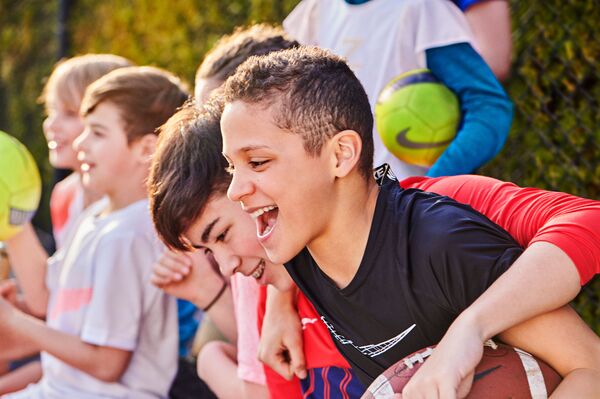Sponsored post. Written by IMG Academy.
 Sports conditioning doesn't only take place in the gym or on the field. Nutrition also plays a huge role and is so important that IMG Academy has nutrition experts on staff. Nutrition education is a significant focus within our boarding school and camp programs. As a parent to a young athlete, it is especially important that you make sure your child has a well-balanced diet because, not only do they require energy to perform at their sport as effectively as possible, but their bodies are also still growing and developing. So where do you start?Â
Here are a few guidelines we recommend at our sports boarding school and sports camps:Â
Day-to-day diet:Â It is important for developing young athletes to focus on incorporating a variety of foods into their diet to ensure they are meeting all of their nutritional needs. An easy goal to work towards - and to teach your child for when the time comes that they are responsible for their own diets - is to incorporate at least three or four different and brightly-colored foods into each meal.Â
Ensure your child follows a consistent fueling routine, meaning they should be eating a well-balanced diet of lean protein, whole grains, vegetables, and fruits on a regular basis without skipping meals or snacks. Your child should have a snack or a meal every three to four hours, which breaks down to about three meals and two or three snacks per day. Not only will this help your child achieve optimal performance athletically, but it will also help to keep them sharp and focused in the classroom.
It's important to remember that your young athlete is still a normal kid, and they're going to want to eat "junk" food like soda, candy, or fried food. There's a time and a place for these types of food in moderation. Rather than absolutely forbid these foods from your child's diet, teach them to enjoy them occasionally and when the food won't impact their training or competition schedules.
Post-workout meals and snacks:Â Research has shown that muscles are the most sensitive to protein and carbohydrates 45 to 60 minutes after a workout, so this is a good time for a recovery snack or meal that includes quick digesting carbs, low-fat protein, and fluids. We want to refuel, repair, and rehydrate (Think the 3 R's) after physical activity.
If your athlete is going to a meal shortly after training, you can skip the snack and refuel with a well-balanced colorful plate of whole grains, low-fat protein, fruits, and vegetables.
Pre-Competition Snacks and Meals:Â First things first, don't do anything new on competition day! Routine is very important for getting into the right frame of mind and staying calm prior to a competition, and this includes food. You also don't want to introduce anything into your child's diet that they might not be accustomed to eating as it could cause some digestive issues that impact their performance.
The ideal timeframe for a pre-competition meal is three to four hours prior so that your child has time to digest the food. A third to half of the meal should be composed of carbohydrates, with the remainder being lean protein, fruit, and vegetables. The goal is to prepare a meal that is low in fat and fiber because these will slow digestion and could cause your child to experience an upset stomach at competition time.
Jackie Barcal, head of nutrition at IMG Academy, suggests the following pre-game meal combinations:
-
Grilled chicken with sweet potatoes and cooked vegetables
-
Grilled shrimp with brown rice and pineapple and green beans
-
Eggs, chicken, or turkey sausage with whole grain toast and avocado or fruit
Post-Competition Snacks and Meals: Many athletes aren't interested in eating after a competition, and that's completely normal. Physical activity can suppress hunger, but you still want to ensure your child is replenishing lost fluids and nutrients. A great post-competition snack would be a fruit smoothie with an NSF Certified for Sportâ protein powder to support muscle recovery. The main components of this meal or snack should be carbohydrates, protein, and fluid.
At IMG Academy, we follow the three Rs of recovery:
     Refuel with carbs.
      Rebuild with protein.
     Rehydrate with fluids.
Jackie's suggested post-competition meal combinations are:
-
A fruit smoothie with 15-20 grams of protein
-
A turkey sandwich with pretzels, a glass of milk, and a side of fruit
-
Six to eight ounces of Greek yogurt topped with granola
-
Pre-packaged protein shakes or bars if something more transportable is ideal
Helping your child maintain a well-balanced diet year-round is critical towards their success both athletically and academically. The nutrition experts at IMG Academy's boarding school and sports camps are committed to guiding our young athletes to build the best dietary plans for their needs as both athletes and as students!
Â



